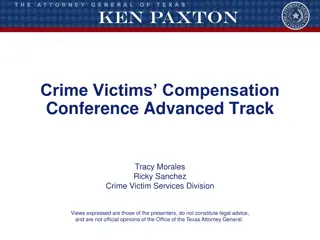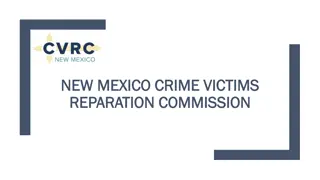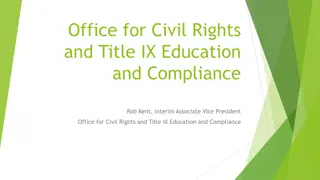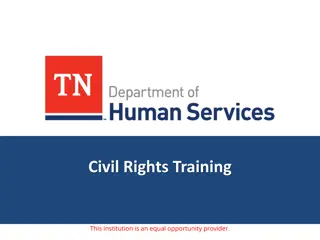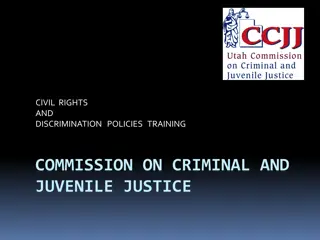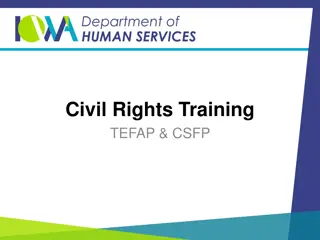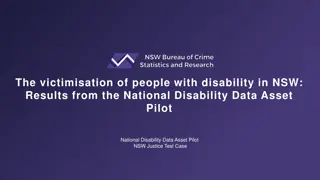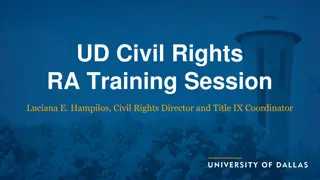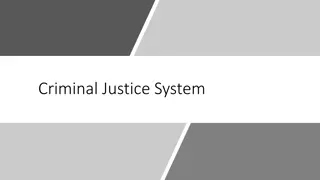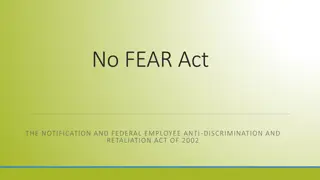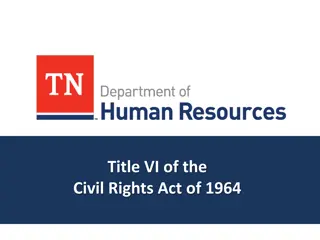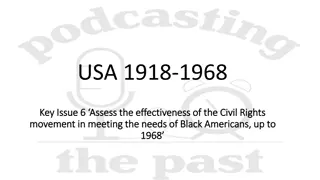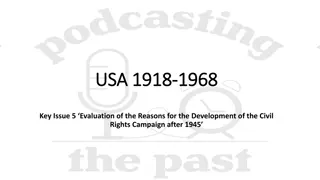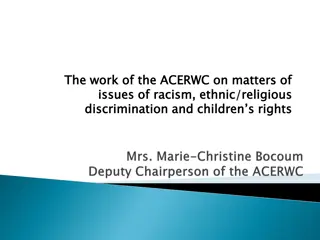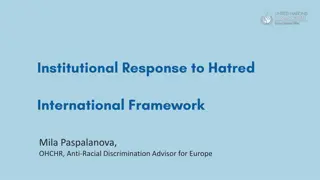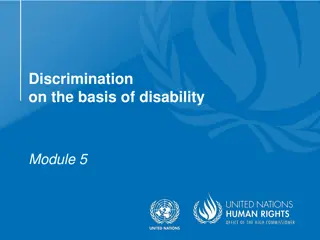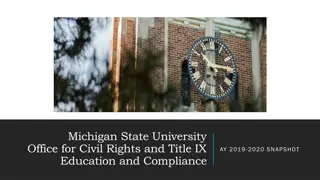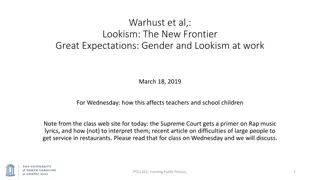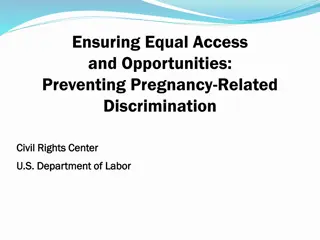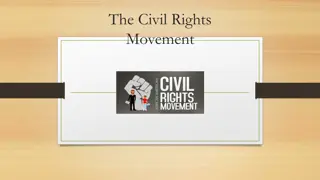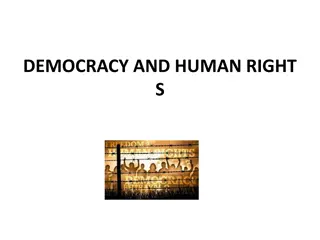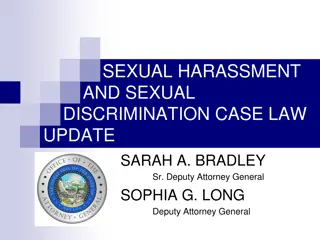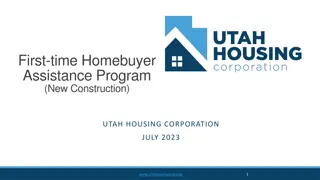Civil Rights and Discrimination Policies Training for Utah Office for Victims of Crime
Approved by the Office of Civil Rights, this training ensures compliance with federal civil rights laws for grant subrecipients. The policy statement emphasizes equal treatment regardless of race, color, sex, religion, disability, and more. Subrecipients are required to have written internal policies on non-discrimination. The program aims to prevent potential claims of discrimination through comprehensive training slides.
Download Presentation

Please find below an Image/Link to download the presentation.
The content on the website is provided AS IS for your information and personal use only. It may not be sold, licensed, or shared on other websites without obtaining consent from the author. Download presentation by click this link. If you encounter any issues during the download, it is possible that the publisher has removed the file from their server.
E N D
Presentation Transcript
CIVIL RIGHTS AND DISCRIMINATION POLICIES TRAINING UTAH OFFICE FOR VICTIMS OF CRIME Approved by Office of Civil Rights on October 2018
INTRODUCTION Compliance with Civil Rights It is the responsibility of the State Administering Agency (SAA) to ensure that its grant subrecipients are complying with all applicable federal civil rights laws.
UOVC Policy Statement All employees, applicants, and program participants of the UOVC s subrecipients, including clients, customers, or consumers, shall be treated equally regardless of race, color, sex, pregnancy or pregnancy-related conditions, age, religion, national origin, or disability. In addition to these, if the subrecipient receives any grants under the Violence Against Women Act (VAWA) of 1994, as amended, 34 U.S.C. 12291(b)(13) prohibiting discrimination in programs either funded under the statute or administered by the Office on Violence Against Women, both in employment and in the delivery of services or benefits, based on actual or perceived race, color, national origin, sex, religion, disability, sexual orientation, and gender identity.
UOVC Policy Statement (Cont.) All individuals have the right to participate in programs and activities operated by UOVC s subrecipients. The UOVC requires all subrecipients to be in compliance with the Legal Sources included in this training.
Civil Rights Training Slides Please review the following PowerPoint slides regarding potential claims of discrimination. After completing the review, print the final slide, the Certificate of Completion, sign and place it in your grant file. The Certificate will be viewed during the monitoring of your grant.
Policy Requirements Subrecipients are required to have a written internal policy on discrimination in the provision of services, discrimination for its employees and program participants. The minimum statement must cover: All employees and applicants of the UOVC s subrecipients, and clients, customers, program participants, or consumers of subrecipients shall be treated equally regardless of race, color, sex, pregnancy or pregnancy-related conditions, age, religion, sexual orientation, gender identity national origin, or disability. In addition to these, if the subrecipient receives any grants under the Violence Against Women Act of 1994, as amended, these protections shall apply to individuals regardless of sexual orientation or gender identity
The Office for Civil Rights enforces Title VI of the Civil Rights Act (Title VI) of 1964, as amended, 42 U.S.C. 2000d, and the DOJ implementing regulation, 28 C.F.R. pt. 42, subpts. C & D (prohibiting discrimination in federally assisted programs based on race, color, and national origin in the delivery of services or benefits); Omnibus Crime Control and Safe Streets Act (Safe Streets Act) of 1968, as amended, 34 U.S.C. 10228(c) & 10221(a), and the DOJ implementing regulations, 28 C.F.R. pt. 42, subpts. D (prohibiting discrimination in programs funded under the statute, both in employment and in the delivery of services or benefits, based on race, color, national origin, sex, and religion) & E (requiring certain DOJ-funded programs subject to the administrative provisions of the statute to prepare, maintain, and submit an Equal Employment Opportunity Plan (EEOP);
The Office for Civil Rights enforces Section 504 of the Rehabilitation Act (Section 504) of 1973, as amended, 29 U.S.C. 794, and the DOJ implementing regulation, 28 C.F.R. pt. 42, subpt. G (prohibiting discrimination in federally assisted programs based on disability both in employment and in the delivery of services or benefits); Title IX of the Education Amendments (Title IX) of 1972, as amended, 20 U.S.C. 1681, and the DOJ implementing regulations, 28 C.F.R. pt. 42, subpt. D & pt. 54 (prohibiting discrimination in federally assisted education programs based on sex both in employment and in the delivery of services or benefits);
The Office for Civil Rights enforces Title II of the Americans with Disabilities Act of 1990, as amended, 42 U.S.C. 12132, and the implementing regulation at 28 C.F.R. 35.171(a)(1)(i), (3)(i) (prohibiting discrimination based on disability both in employment and in the delivery of services or benefits); Age Discrimination Act (Age Act) of 1975, as amended, 42 U.S.C. 6102, and the DOJ implementing regulation, 28 C.F.R. pt. 42, subpt. I (prohibiting discrimination in federally assisted programs based on age in the delivery of services or benefits);
The Office for Civil Rights enforces Juvenile Justice and Delinquency Prevention Act (JJDPA) of 1974, as amended, 34 U.S.C. 11182(b), and the DOJ implementing regulations, 28 C.F.R. 31.202, .403 & pt.42, subpt. D (prohibiting discrimination in programs funded under the statute, both in employment and in the delivery of services or benefits, based on race, color, national origin, sex, and religion); Victims of Crime Act (VOCA) of 1984, as amended, 34 U.S.C. 20110(e) and the regulation implementing the Victim of Crime Act Victim Assistance Program, 28 C.F.R. 94.114 (prohibiting discrimination in programs funded under the statute, both in employment and in the delivery of services or benefits, based on race, color, national origin, sex, religion, and disability);
The Office for Civil Rights enforces Violence Against Women Act (VAWA) of 1994, as amended, 34 U.S.C. 12291(b)(13) (prohibiting discrimination in programs either funded under the statute or administered by the Office on Violence Against Women, both in employment and in the delivery of services or benefits, based on actual or perceived race, color, national origin, sex, religion, disability, sexual orientation, and gender identity) (referring to the Safe Streets Act for enforcement); and Executive Order 13,559, amending Executive Order 13,279, and the DOJ implementing regulation, Partnerships with Faith-Based and Other Neighborhood Organizations, 28 C.F.R. pt. 38 (prohibiting discrimination in federally assisted social service programs based on religion in the delivery of services or benefits).
Title VI of the Civil Rights Act of 1964 No person in the United States shall, on the ground of race, color, or national origin, be excluded from participation in, be denied the benefits of, or be subjected to discrimination under any program or activity receiving Federal financial assistance. 42 U.S.C. 2000d 28 C.F.R. 42.101 et seq.
Program Statutes -Safe Streets Act, Victims of Crime Act, and Violence Against Women Act of 1994 Safe Streets Act: prohibits discrimination in programs funded under the statute, both in employment and in the delivery of services or benefits, based on race, color, national origin, sex, and religion. 34 U.S.C. 10228 28 C.F.R. 42.201 et seq.
Program Statutes -Safe Streets Act, Victims of Crime Act, and Violence Against Women Act of 1994 ( Cont.) Victims of Crime Act (VOCA) of 1984, as amended, 34 U.S.C. 20110(e) and the regulation implementing the Victim of Crime Act Victim Assistance Program, 28 C.F.R. 94.114 (prohibiting discrimination in programs funded under the statute, both in employment and in the delivery of services or benefits, based on race, color, national origin, sex, religion, and disability)
Program Statutes -Safe Streets Act, Victims of Crime Act, and Violence Against Women Act of 1994 ( Cont.) Violence Against Women Act (VAWA) of 1994, as amended, 34 U.S.C. 12291(b)(13) (prohibiting discrimination in programs either funded under the statute or administered by the Office on Violence Against Women, both in employment and in the delivery of services or benefits, based on actual or perceived race, color, national origin, sex, religion, disability, sexual orientation, and gender identity) (referring to the Safe Streets Act for enforcement)
VAWA Reauthorization Act of 2013 No person in the United States shall, on the basis of actual or perceived race, color, religion, national origin, sex, gender identity (as defined in paragraph 249(c)(4) of title 18, United States Code), sexual orientation, or disability, be excluded from participation in, be denied the benefits of, or be subjected to discrimination under any program or activity funded in whole or in part with funds made available under [VAWA], and any other program or activity funded in whole or in part with funds appropriated for grants, cooperative agreements, and other assistance administered by the Office on Violence Against Women.
VAWA Reauthorization Act of 2013 (continued) If sex segregation or sex-specific programming is necessary to the essential operation of a program, nothing in this paragraph shall prevent any such program or activity from consideration of an individual s sex. In such circumstances, grantees may meet the requirements of this paragraph by providing comparable services to individuals who cannot be provided with the sex-segregated or sex-specific programming. 34 U.S.C. 12291(b)(13) OCR has posted FAQs on the VAWA nondiscrimination provision at http://ojp.gov/about/ocr/pdfs/vawafaqs.pdf.
VAWA Reauthorization Act of 2013 (continued) o Sex-Segregated Programming - When males and females receive services in separate settings o Sex-Specific Programming - When a recipient designs programming differently for males and females Beneficiaries choose the appropriate program based upon gender identity
VAWA Reauthorization Act of 2013 (continued) o Necessary to the Essential Operation of a Program - Fact-specific inquiry, consider: Nature of the service Consequences to beneficiaries of making sex-segregated or sex-specific Literature on efficacy Impact on transgender clients Reasons may not be trivial, based solely on convenience, or rooted in stereotypes
VAWA Reauthorization Act of 2013 (continued) Comparable Services - Fact-specific inquiry, consider: Nature, quality, and duration of the service Relative benefits of different therapeutic modalities Geographic location o
Section 504 of the Rehabilitation Act Prohibits discrimination on the basis of race color, national origin, religion, or sex, in the delivery of services and employment practices by Office of Justice Programs (OJP), Office on Violence Against Women (OVW), or Office of Community Oriented Policing Services (COPS) funded programs or activities. 29 U.S.C. 794 28 C.F.R. 42.501 et seq.
Title II of the Americans with Disabilities Act of 1990 Prohibits discrimination on the basis of race color, national origin, religion, or sex, in the delivery of services and employment practices by Office of Justice Programs (OJP), Office on Violence Against Women (OVW), or Office of Community Oriented Policing Services (COPS) funded programs or activities. 42 U.S.C. 12132 28 C.F.R. Pt. 35
The Age Discrimination Act of 1975 Prohibits discrimination on the basis of race color, national origin, religion, or sex, in the delivery of services and employment practices by Office of Justice Programs (OJP), Office on Violence Against Women (OVW), or Office of Community Oriented Policing Services (COPS) funded programs or activities. 42 U.S.C. 6102 28 C.F.R. 42.700 et seq.
Title IX of the Education Amendments of 1972 Prohibits discrimination on the basis of race color, national origin, religion, or sex, in the delivery of services and employment practices by Office of Justice Programs (OJP), Office on Violence Against Women (OVW), or Office of Community Oriented Policing Services (COPS) funded programs or activities. 20 U.S.C. 1681 28 C.F.R. Pt. 54
DOJ Regulations issued for FBO guidance (revised April 4, 2016) FBOs must not use direct federal funding to engage in explicitly religious activities. Explicitly religious activities must be separate in time or location from federally-funded activities, and must be voluntary for those participating in the federally-funded activities. FBOs may not discriminate against beneficiaries based on religion, a religious belief, a refusal to hold a religious belief, or a refusal to participate in a religious practice.
New Notice and Referral Requirements for FBOs FBOs must give written notice to beneficiaries and prospective beneficiaries that: FBO will not discriminate on the basis of religion, a religious belief, a refusal to hold a religious belief, or a refusal to participate in a religious practice; FBO may not require beneficiaries to participate in any religious activities; FBO will separate in time or location any privately- funded religious activities from federally-funded activities; and
New Notice and Referral Requirements for FBOs (cont.) If a beneficiary objects to the religious character of the FBO, the FBO will undertake reasonable efforts to identify and refer the beneficiary to an alternative provider that is acceptable to the beneficiary. Alternative provider must be in reasonable geographical proximity to the FBO and offer services comparable in substance and quality. FBO must maintain a record of the referral. If the FBO is unable to identify an alternative provider, it shall notify the SAA or the DOJ.
New Notice and Referral Requirements for FBOs (cont.) FBO must provide this written notice prior to the provision of services. A sample notice is contained at Appendix A to 28 C.F.R. pt. 38. A sample beneficiary referral request is contained at Appendix B to 28 C.F.R. pt. 38.
The Utah Labor Commission enforces The Utah Anti-discrimination Act of 1965 which prohibits employment discrimination on the basis of race, color, national origin, gender, religion, age, and disability. Also prohibits employment discrimination on the basis of pregnancy, childbirth, or pregnancy-related conditions. Utah Code Annotated, Title 34A Chapter 5
Subrecipients Subrecipients must have procedures in place for accepting and processing discrimination complaints that employees, applicants, clients, and customers file directly with the subrecipient, which may involve investigating the complaint internally or referring the complaint to an appropriate external agency for investigation such as the Utah Office for Victims of Crime (UOVC),
UOVC Procedures When Responding to Claims of Discrimination Step 1 Contact the Complaint Coordinator by telephone, in writing, or by email with your complaint at: Ms. Hildegard Koenig, Outreach Program Coordinator Utah State Office for Victims of Crime 350 E. 500 S. Suite 200 Salt Lake City, Utah 84111 385-479-0715 hkoenig@utah.gov * Alternate methods of filing complaints shall be made available to individuals with disabilities unable to file written complaints *
Step 2 Provide the following information : Name; Address; Telephone, Cell Phone, Work Phone; Date of Birth; A brief description of the alleged discrimination or civil rights violation; Including the date, place, and time; Names of any Respondents accused of discrimination (if known); A brief description of the communication that has already occurred to address the issue; and Any other relevant information.
Step 3 The Complaint Coordinator will contact you Within ten (10) business days after receipt of the complaint.
Step 4 The Complaint Coordinator will mail a letter, and where appropriate, in a format accessible to the complainant, such as large print, braille, or audio tape indicating the actions taken in forwarding your complaint to the Utah Antidiscrimination & Labor Division and notification to the Office for Civil Rights.
EQUAL EMPLOYMENT OPPORTUNITY PLANS - EEOP Every subrecipient of a UOVC grant must comply with EEOP procedures. EEOP is a workforce report that some must complete as a condition of a grant award. All subrecipients must complete a Certification Form. Government Agency - Based on: Amount of the award; and Number of employees. Non-Profit Entity Exempt from filing an EEOP; however You must file a Certification Form with the Office for Civil Rights.
DOCUMENTS ON FILES You must have on file: EEOP if required Certification Form Section A Completed OR Section B Completed Please consult with your Human Resource Department on requirements You can access the Certification Form at https://ojp. gov/about/ocr/eeop.htm *Documents must be submitted electronically *
Review Office for Civil Rights PowerPoint Office for Civil Rights PowerPoint which further outlines and explains Civil Rights Requirements of Subgrantees is also available on UOVC s website, crimevictim.utah.gov. Please review this PowerPoint as well.
CERTIFICATE OF COMPLETION I certify I have reviewed these PowerPoint slides regarding federal grant funded projects, policies and the legal sources that prohibit discrimination and I have the Certification Form on file for viewing. Grant # _____________ Date: _____________ Project Director ______________________ Signature Please print and sign this slide; place it in your grant file for review at monitoring time.



